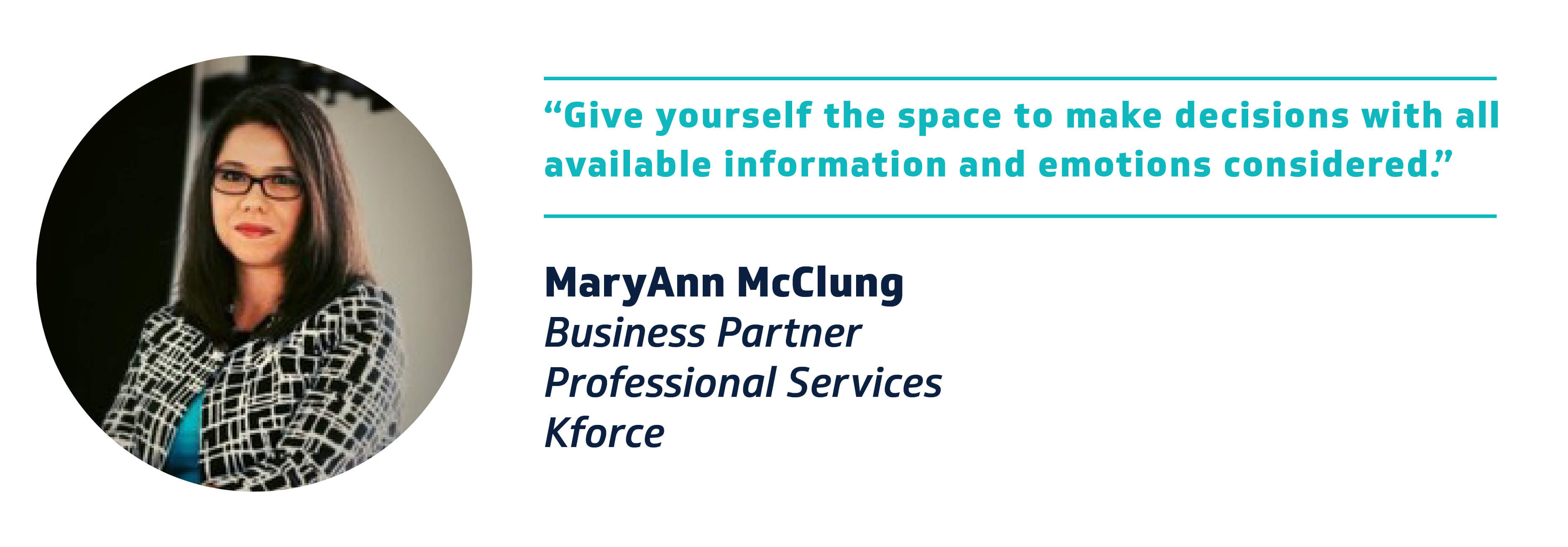
PUBLISHED SEPTEMBER 9, 2020
Six Women Share Their Keys to Success When Leading Through a Crisis
Pandemics and protests are reshaping our society, uprooting lives and fracturing norms, reminding us in the process that the world of business is not immune. While medical professionals fight to save every life they can, we in the business world are doing what we must to keep the global economy and our respective enterprises off of respirators. Fortunately, we don't have to work alone.
Few would deny that we are learning as we go. By pooling our wisdom and leveraging our experience, we can flatten that learning curve and ease our transition into whatever comes next. It is in this spirit that we conversed with six savvy women, prominent leaders across various industries, asking them to share their keys to success.

"In a crisis," offers Melissa Thompson, SVP of Talent Acquisition at Nielsen, "saying 'we've always done it that way' won't help. Think outside the box, break the box, but allow for creativity and innovation."
Social-distancing tests the creative flexibility of the entire business world, draining our conference rooms and intentionally minimizing personal contact. But Amy Wheelus, VP of Architecture and Strategic Planning for AT&T, found a creative way to increase her connection with individual team members despite distance—by getting out of the house and walking.
"Science tells you that you remember things better when you're active," says Wheelus. "When one or both of us are taking a walk, we're focused on each other. And so, by virtue of going for a walk together—remotely—it helps us connect."

Another great AT&T leader, Stacey Marx, President of National Business and Channels, emphasizes staying connected with teams and customers alike. "We upped our communications game," says Marx, "highlighting valued members, sharing quarantine stories, and creating a weekly video series to support a cohesive team and emphasize our common goals."

Marx adds, "It's also important to stay visible to your clients, whether through social media, emails, or phone calls. Reassure them that your team is staying focused and their business remains a top priority."
However, effective communication is about more than the tools we use to stay in touch. "Empathy is very important," says Andrea Masterson, Director of Corporate Responsibility at Raymond James. "Our teams are often working through crisis-response in a professional setting while also dealing with the crisis on a personal level."

Chloé Rada, Director of Global Recruitment Marketing and Branding for Syneos Health, advises us, "When developing a response plan, make sure that your guidance includes practicing empathy, transparency and responsiveness with all stakeholders." She is quick to add, "It’s this human connection that is needed to get through a crisis together!"
On the other hand, as Kforce Business Partner MaryAnn McClung knows, before we can be strong for others, we have to be strong for ourselves. "Give yourself the space to make decisions with all available information and emotions considered," McClung suggests. "Even if things are going as well as they can be, it doesn't mean the situation isn't stressful. So, find ways to recharge during the workday, on the weekends, or with some much-needed time off."
Innovate and Repeat
Although people—our teams and our clients—are the undeniable alpha and omega of success, it is important not to neglect the business itself. Driving innovation, revenue, and market share have been topped by difficult conversations about gender and race in the workplace, health and safety during the pandemic, and the ins-and-outs of remote work.

As a Director, Chloé Rada understands the impact of shifting social landscapes. "It’s crucial to address your hiring landscape," says Rada, "and remain supportive, flexible and transparent to the business as you manage through an unknown or unprecedented time." She also advises, "Have [your team] rework or reinvent their initiatives so that, when things start to recover, they can rebound without sacrificing a continuous mindset."
MaryAnn McClung agrees that we should keep our eyes on the road. Incoming rapid-fire crises may seem to present a clear-cut agenda to deal with, but McClung urges, "Don't lose your 50,000-foot perspective. During a crisis, it's easy to focus on the weeds, but this doesn't always lead to the longer-term, bigger picture your team or company needs. If we look at each crisis as a transformation, instead of a single but temporary event, we can understand and navigate this transformation mindfully."
Of course, having a sense of direction doesn't mean the journey will be without peril. "Change will be constant and, under pressure, mistakes will be made," Melissa Thompson warns, again stressing the importance of flexibility, and knowing when to "let the small stuff slide."

One important step in taming a wilderness is making a map. When it comes to trailblazing and guiding a business forward, Andrea Masterson suggests, "Keeping a list of accomplishments, projects completed and so on, can be a helpful reflection of what you have completed during the crisis." The hidden strength of this suggestion is in its positivity: sometimes it's important to take a break from trudging the road ahead and remember how far you've come.
But, just like our teams and clients, our businesses need us to keep ourselves emotionally and physically healthy. Amy Wheelus implores that we not forget, "In order to take care of your people and customers, you must take care of yourself. This is the number one tip for persevering throughout a prolonged crisis."
So, how do these businesswomen continually find the strength to plot a forward course, guiding their teams and clients through hazardous, untraveled terrain? Stacey Marx sums it up. "The word I keep coming back to is grace. To me, leading with grace means leading with gratitude and authenticity. I'm noticing it so much more in my interactions with my team, our customers, and in my community.
People are coming from a place of empathy, and conversations are becoming more thoughtful. We're learning more about our clients' businesses, their families, and their struggles. And, as a result, we're uncovering new opportunities. Every conversation we have is a chance to extend grace and offer help—whether it's a business solution or just a virtual shoulder to lean on."
